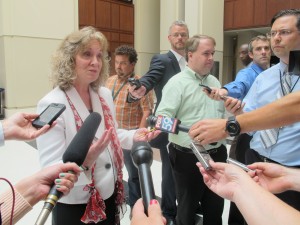If Glenda Ritz Runs For Governor, What Are Her Chances?

State Superintendent Glenda Ritz speaks to reporters outside the State Board of Education meeting in July, when she engaged with board members about her duties as board chair. photo credit: Rachel Morello / StateImpact Indiana
After telling reporters at the end of this year’s legislative session that she will consider a run for governor, it’s looking more and more likely that state superintendent Glenda Ritz will enter the race in the coming weeks.
After a session full of education issues, including a bill that originally aimed to remove Ritz from her role as chair of the State Board of Education, Ritz expressed frustration with Governor Pence.
“After viewing the outcome of this general session, it’s caused me to have pause and actually look at how I might want to reframe what I might want to do to move education forward,” Ritz said at that April press conference.
Before she ran for superintendent, Ritz worked as an elementary school librarian, and gained massive support from teachers unions. She famously received more votes than Pence, and that support has backed her throughout the conflicts between her and Pence.
Brian Howey, publisher of Howey Politics Indiana, writes that these same supporters are encouraging Ritz to pursue the nomination for governor:
Sources tell me Ritz is finding a wide array of encouragement to challenge Pence. The school of thought here – pun intended – is that Ritz is the best candidate to accentuate the deep education divisions that exist, and exploit them to bring out a coalition of educators, their wider families and friends, and the hundreds of thousands of moms out there.
Although Ritz had overwhelming support during her 2012 campaign for state superintendent, Indiana political analyst Ed Feigenbaum says support from that election might not translate to a gubernatorial race.
“The reason that she won in the general election is because she wasn’t Tony Bennett,” Feigenbaum says. “And that’s not how she would run in a Democratic primary for governor. So I think she would have to position herself a little differently and I’m not sure that the people who ended up voting for her in the fall wouldn’t necessarily be the same people that would vote for her in the primary.”
Andy Downs, Director of the Mike Downs Center for Indiana Politics, says Ritz’s experience exclusively in education and education policy will be the biggest point of concern for voters on the fence.
“It could be that people think she has been a good superintendent and will continue to be a good superintendent but that she may not make a good governor,” Downs says.
Even though her opponents will use Ritz’s narrow experience as a reason to not vote for her, Downs says education is something that is easily tied back into economics and other areas a governor would oversee.
If she wins the Democratic nomination to face Pence, the disagreements and fighting Pence and Ritz already engage in will take center stage. One of the bigger fights between the two was when Pence created the Center for Education and Career Innovation shortly after Ritz took office. The state agency performed similar tasks to Ritz’s Department of Education, creating a lot of confusion about who had authority and power over certain situations. Ritz has also clashed with members of the SBOE, all appointed by either Pence or former governor Mitch Daniels, creating more tension between the two entities.
Downs says this history of disagreements that plagued the news the last few years could turn away some voters from the race altogether.
“We’re already looking at a fair number of non very exciting races,” Downs says. “If people see not very exciting races and then one race that might be exciting, the race for governor, between two people who can’t seem to get along, who can’t behave themselves, so to speak, voters might just say ‘forget it, I’m not going to bother.'”
If she decides to run, Ritz will face state senator Karen Tallian, D-Portage, and former state representative and gubernatorial candidate John Gregg.

